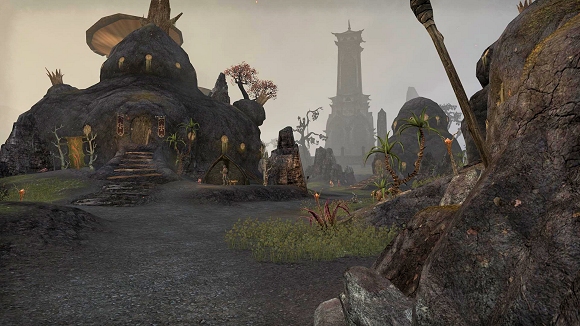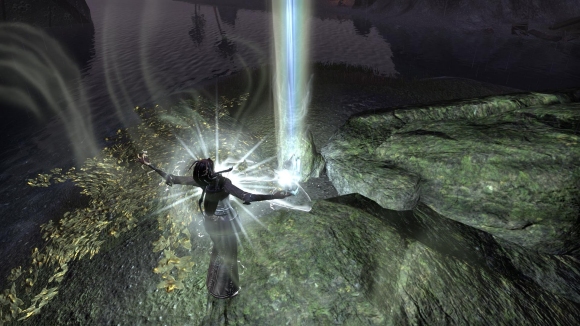
It’s been about nine months since I first got my hands on The Elder Scrolls Online. Since then, like many of you, I’ve been trapped on the sidelines, watching and waiting for my turn to jump into the game. This past weekend, I got my chance, but I’ve found my experience to be distressingly similar to thosedescribed by other journalists. Like Massively’s Eliot before me, my early foundation was in console gaming, but my reason for avoiding The Elder Scrolls series was very different from his: The Elder Scrollshas always been a single-player series, and after having my world opened by MMOs, I found that going back to single-player games has become difficult. I need people! I need multiplayer options! I need MMOs.
Enter The Elder Scrolls Online and my excitement for it. I knew a lot of the series’ famed freeform gameplay would be cut back in exchange for letting me play alongside my friends, but that was something that I, as a series newbie, was willing to sacrifice. But while my overall impression of the game was positive, I still have this lurking sensation that something important was missing.
Rather than think of ESO an MMO, I decided to think of the game as a single-player RPG with a multiplayer option, the way I play Star Wars: The Old Republic. Instead of investing in the community as I would in a traditional MMO, I focus more on my own storyline and helping friends. I explore the heck of it, but I don’t pursue achievements. I expect an end at endgame, not a living world or repetitive activities to keep me logging in.

With that in mind, I partnered with a friend and rolled an Argonian, appreciating very much the character creator since I skipped past it during my earlier play-through at last year’s E3. The graphics and models in general are much nicer than what I saw in my limited time in Skyrim. The basic controls exemplify what all MMOs should aspire to in that they’re rather simple and use A&D as strafe keys rather than turn keys. Alt, E, R, and other keys the game makes use of are very accessible with just the left hand.
At the start, the game feels linear but still encourages a bit of exploration (e.g., opening a certain bookshelf may increase your heavy armor skill). It felt like playing Dragon Age 2 with a better version ofGuild Wars 2‘s combat — it’s not revolutionary, but it’s fluid enough. I’ve heard complaints about the game feeling “floaty,” which may come from the slow reaction and cast times of the starter mobs, but certain effects (especially exploding corpses) really train you early on to not stand in the red zones.
However, the story is also what you might expect from GW2 rather than DA2. I’m the only one who can save the world, it seems, even though my partner is waiting for me after having done the exact same thing. You’d think that after SWTOR and GW2, quest writers would see that no, we don’t need to be the lone hero. This isn’t a single-player RPG, and most of us immediately lose immersion when we see other people in the same area we “heroically” arrived at. Now, try to imagine walking around a busy city on a normal Monday morning when everyone is pantomiming various circus and fire-fighting related jobs as you try to make your way to work. That’s what emerging from the first tutorial feels like. It’s not so much a world as it is a video game where other people have their own pink elephants to deal with.
One of those other people was my partner. Finally, we could group, right? Nope. I could see an arrow where he should have been, and the game said we were grouped together, but something wasn’t quite right. After some technical jiggery-pokery, we could finally see each other and get to our questing, but the content didn’t quite work for a team. It wasn’t that it was too easy; it was that the entire environment as designed needed only a few people in it to feel overcrowded and broken. In fact, a few quests didn’t update even though we were grouped together, and realizing that we couldn’t share all the awesome stuff we found in the game world also degraded the multiplayer aspect. For example, while we both could loot creatures we killed while in a group, ore and bug nodes and chests were still limited to first come, first serve, mechanics fast becoming more dated by the year.
Several times while climbing mountains, ledges in caves, waterfalls, and other adventure locations, I’d round the bend only to find some other guy wrist-deep in what I expected to be a virgin treasure chest just for me. The combination of instancing to make a world just for me while still using limited node supplies felt contradictory and unwelcome. Apparently while fishing, more people using the same node increases the chances of finding rare fish and speeds the depletion rate, but I could never find enough people who wanted to fish to test it out, probably because crafting doesn’t seem to affect base experience gain, contrary to other TES games.

On the other hand, the crafting experience itself enhanced the MMO feel of the game. While you can’t become a master of everything, crafting basics are all available to you as a newbie. Players can specialize in a few schools or become jacks-of-all-trades, a system intended to encourage trade, though we can expect armies of alts to put an end to that. Skills raise as you use them, but to pick up new skills, you must dip into the pool you’d normally assign to combat skills, which would seem to encourage crafting mules. For example, one skill made resources easier to spot thanks to a smokey aura.
Some crafts amount to simplistic click-to-craft gameplay without minigame or quality considerations, but the customization seems deeper even for lowbies. For example, alchemy and enchanting allowed me to combine various ingredients to make something new. I actually made nothing on my first try and wasted my mats, but that was good motivation for me to get back out there to hunt for more, explore new places for new ingredients, and maybe actually read some of those notes I was blasting through while exploring. A second attempt resulted in a potion that slowed down my run-speed, showing that those who avoid spoiler sites will need to learn what ingredients do and write down or memorize recipes.
Blacksmithing, on the other hand, started with the basic click-to-craft mechanic, but increasing the number of ore used raised the stats (and level) of the item. It also had a lot of visual and stat customizations for me to unlock or change, which reminded me of Albion‘s crafting, but with low levels and low material supply, it was hard to extrapolate. For example, I found a woodworking area inside a dungeon that hinted at special crafting abilities, but I hadn’t learned any recipes I could use there. Apparently there are books scattered around the world that unlock them, but I never found one. I did, however, find several cooking recipes, and the hunt for them was rewarding.
Ultimately, where unsocial nodes and limited leveling paths are disappointments, crafting and exploration are true gems. Rummaging around people’s houses and towns for just scraps of leather, a few wine grapes, or even goat meat is a lot of fun for me. Yes, there are a lot of lockpicks in the first zone, but I enjoyed that little minigame of correctly timing my press and release of various levers with my mouse. It’s not perfect, but it’s more entertaining than simply right clicking and waiting for a success/fail message; knowing that some other guy is waiting next to the chest ready to break it open if I fail added a bit of a sense of urgency.

This is the very feature that is perplexing me about The Elder Scrolls Online: Multiplayer at this early stage seems irrelevant. I can only trust that it blossoms later, but why wait? If my friend is coming along, I want to leave crumbs on the ground for him to follow in case I get lost. I want to toss him a rope, have him help me lift something I couldn’t lift on my own, just something different from the usual MMO murderfests we’ve had for over a decade. The quest design itself has plenty of RPG appeal in that when I was on the main quest, I wasn’t simply tasked with killing 10 rats (that’s reserved for side quests).
But to my irritation, the few choice I’ve made (when given an option) didn’t seem to change anything, in contrast to my experience with SWTOR’s conversation trees and dice roll-offs that created reasons to repeat quests, both alone and in groups. Sure, in ESO, I helped reinforce the wall rather than directly attacked. No one important died, no one blamed a failure on me, and I was once again the hero. The whole thing left me feeling rather hollow, especially alongside my partner, who contentedly treated it just like all the other quests we’d already done — because it was. Much later, I came upon some of the NPCs whom I had helped, all mourning ones I presume I did not. Maybe this was a hint that my decision did matter, or maybe it was just for flavor, but there was no clear indication that my choice had led to that gathering, and I think that says a lot both about the game’s single player RPG qualities and its multiplayer.
As much as I enjoyed my beta weekend in The Elder Scrolls Online, my experience simply didn’t feelsubstantial enough. The bugs alone caused me to take breaks to play other games and get some work done. As much as I’d like to believe in the game and its developers, what we’ve been allowed to see in this current version less than two months from launch just feels incomplete and at odds with the rest of the game. Every time I felt the urge to pre-order, I found myself considering the game as an investment, not as something joyous and wonderful that I’d be playing come April. Like many people, I fully expect the game to go either free-to-play or buy-to-play eventually, and I’ve felt that “founder burn” from other single-player-with-multiplayer-options RPG before. The question of how much the game will be worth after a conversion is too strong in my mind to ignore. I just don’t think the value is there right now for an MMO player like me, and I don’t see an easy fix, with or without PvP.
I still feel the urge to purchase a new multiplayer game or RPG, but it probably won’t be ESO.
Source from:http://massively.joystiq.com/2014/02/14/the-elder-scrolls-online-fitting-into-the-genre-or-forging-its/
Leave a Reply